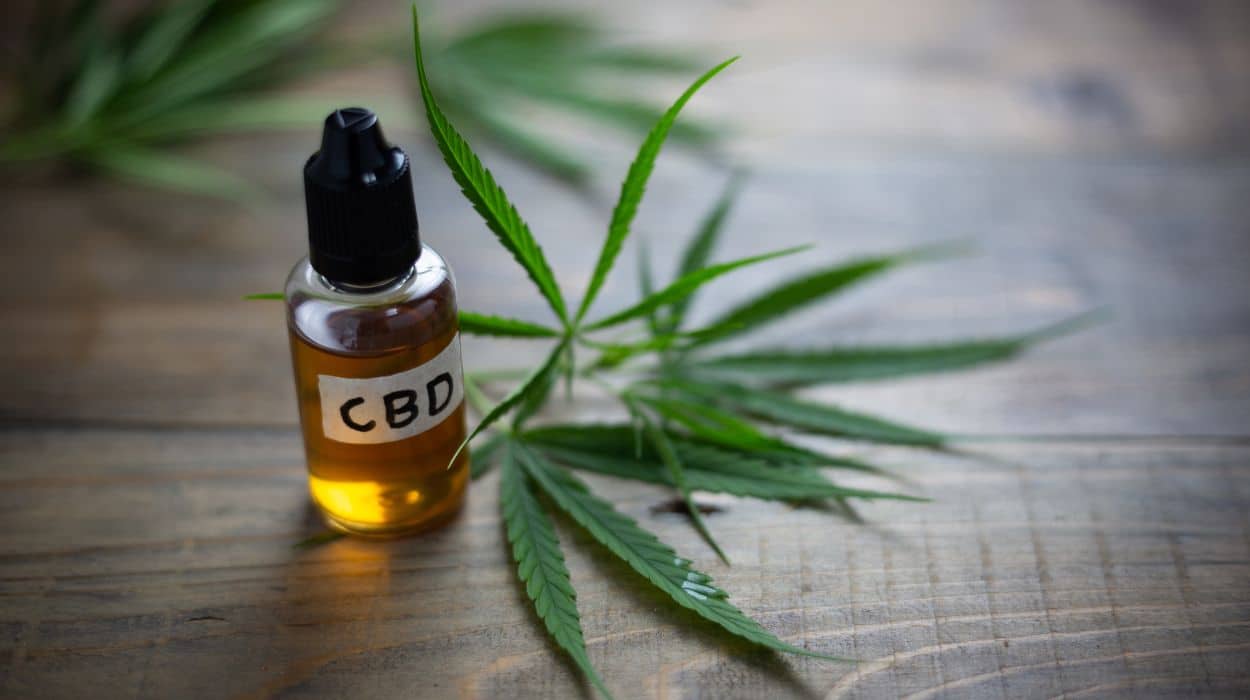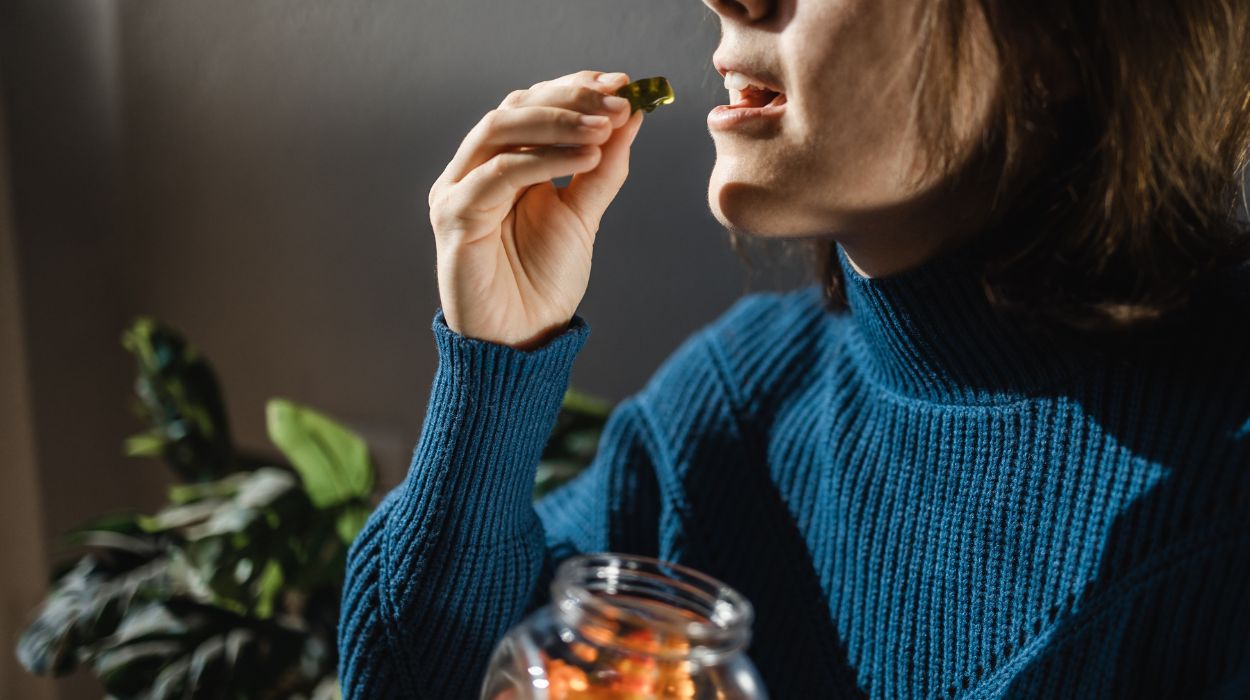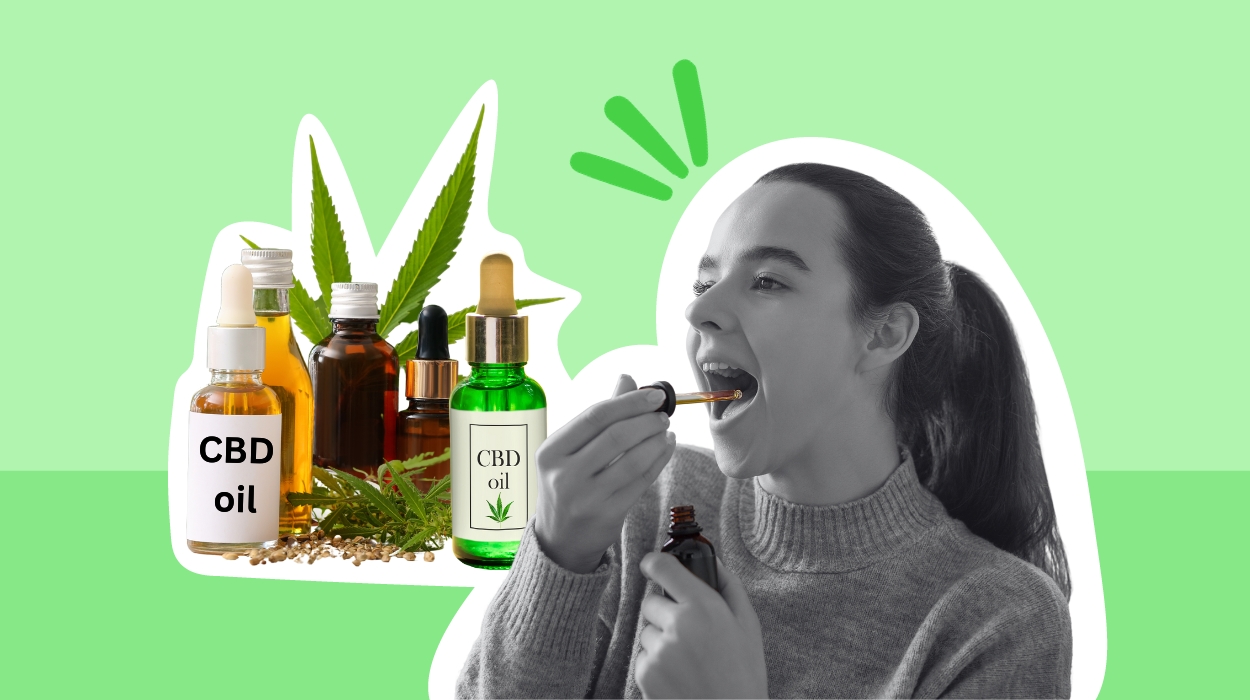The benefits of CBD oil are shrouded in myths, making any information regarding them unreliable. However, their benefits exceed these myths, and we will discuss CBD oil as an asset.
This article discusses its legality, potential side effects, consumption, what to look out for when purchasing CBD products, and, most significantly, nine medical benefits of cannabidiol that have been verified.
9 Amazing Benefits Of CBD Oil
- Offset Anxiety & Depression
- Treat Select Epilepsy Syndromes
- Reduce PTSD Symptoms
- Treat Opioid Addiction
- Alleviate ALS Symptoms
- Relieve Chronic Pain
- Ease Diabetic Complications
- Protect Against Neurological Disease
- Inhibit Arthritis Symptoms
CBD Oil Benefits For Health
Offset Anxiety and Depression
The most recent research[1] on CBD treatment for anxiety and sleep disorders was dated 2019. The research’s objective was to determine whether CBD improves sleep and reduces anxiety.
The result showed that out of the 72 adults who volunteered for the research, their anxiety decreased with continuous usage while sleep improved.
Treat Select Epileptic Syndromes
Living with seizure disorders triggered by epilepsy syndromes is tougher when nothing helps or reduces uncontrollable seizures. However, did you know CBD-rich medical cannabis has beneficial effects that help cope with repeated bouts?
There isn’t enough evidence to back this claim. Tuberous sclerosis complex, Dravet syndrome, and Lennox-Gastaut syndrome are the three health issues, including the placebo group the FDA approved to be treated with CBD oil. Still, it is suspected that CBD interacts with the endocannabinoid system, which regulates appetite, sleep, pain, and immune system response and reduces its neuron excitability.
Reduce PTSD Symptoms
Human studies[2] show that the addition of oral administration of CBD to routine psychiatric care reduces post-traumatic stress disorder in adults. However, a balanced THC and CBD medication proves more effective than CBD alone.
Treat Opioid Addiction
Symptoms like anxiety, depression, pain, insomnia, nausea, and high blood pressure also occur during opioid addiction. Studies investigating[3] suggested that treatment with medical cannabis proved that opioid addiction could be well-tolerated with no side effects while using CBD.
Alleviate ALS Symptoms
Cannabidiol is not a cure for Amyotrophic Lateral Sclerosis (Lou Gehrig’s disease), the weakening or paralysis of the muscle, but it helps significantly reduce the symptoms. CBD may alleviate ALS symptoms, but the combination of THC and CBD will produce more effective results.
Relieve Pain
CBD may be referred to as one of the pain medications on the market because of its effectiveness in reducing and relieving severe inflammatory and neuropathic pain. Studies suggest that rubbing topical CBD in the form of creams on the affected area shows a significant reduction in swellings and other cancer-related symptoms because of the anti-inflammatory properties of CBD. While other cancer pain, cancer-related pain, injuries, etc., drastically reduce when CBD enters the bloodstream.
Ease Diabetic Complications
Human studies aren’t popular, but animal research suggests that CBD may lower the risk of diabetes by turning white fats into slimming brown fats. It also reduces high blood sugar (hyperglycemia), lowers cholesterol, and increases insulin production until it is regulated.
Protect Against Neurological Disease
CBD impacts the neurotransmitters to improve sleep, relieve anxiety, reduce muscular tension, regulate dopamine production, and activate the production of more endocannabinoids for the proper functioning of the nervous system. Alzheimer’s disease, Dravet syndrome, Parkinson’s disease, Neuropathic pain, Schizophrenia, and other severe forms of neurological disorders are regulated by CBD consumption.
Inhibit Arthritis Symptoms
Several human trials indicate that CBD may increase pain tolerance and offer pain relief for individuals with arthritis by improving sleep quality and reducing anxiety and addictions. CBD may be inhaled by vaping, applied directly onto the skin, or taken by mouth.
What Is CBD?

CBD,[4] also known as cannabidiol, is one of the cannabinoids found in the cannabis (hemp) plant, Cannabis sativa. has analgesic, anti-inflammatory, anti-tumor, and chemopreventive properties, but no psychotropic properties. CBD oil is an extract of CBD diluted in a carrier oil like coconut oil, MCT oil, or hemp seed oil.
The hemp plant is the perfect plant for making CBD oil because the plant contains a minute amount of tetrahydrocannabinol (THC) compared with Cannabis indica. THC is the major psychoactive cannabinoid found in the cannabis plant.
Is CBD Legal?
The legality of CBD depends on your state, i.e., CBD products are legal under some state laws and are illegal at the federal level. In comparison, other hemp-derived CBD products containing less than 0.3% THC are permitted nationally and are still illegal in some states.
Before purchasing any CBD products, check your state’s law and the places you travel. The Food and Drug Administration does not approve CBD products because they are non-prescription drugs and might be inaccurately labeled.
Does CBD Work?
Some scientific evidence supports the benefits[5] of CBD, but it does not work for all health conditions as advertised by some CBD brands. CBD does not cure cancer, but it reduces swelling obtained during cancer treatments; it is a pain management medication that improves sleep disorders and reduces seizures from Lennox gestalt syndrome and muscle spasticity from multiple sclerosis; it also relieves panic attacks and anxiety disorders.
The argument of using CBD, whether by direct contact with the skin or orally, fuels up the uncertainty of using CBD because there is more evidence to show that consuming oral CBD increases sleep quality and reduces chronic pain and anxiety and less evidence that proves they do the same when rubbed onto the skin, so why the contradiction? This contradiction doesn’t change the health benefits of using CBD oil.
What Are The Side Effects Of CBD Oil?
The regular and safe dosage for CBD is up to 200 mg daily for 13 weeks; more dosage information is accompanied by the CBD brand of your choice, as some prescriptions come in higher doses.
Going beyond the regulated dosage will cause some side effects, such as:
- Dry mouth
- Acute and anticipatory nausea and vomiting
- Decreased blood pressure
- Drowsiness and fatigue
- Immune suppression
- Diarrhea
- Weight loss or gain
- Light-headedness and headaches
- Lover damage
- Increased or reduced appetite
- Irritability
What’s The Best Way To Take Pure CBD?
There are several ways to take pure CBD, but choosing the most effective method of consumption guarantees that you enjoy all the health benefits of CBD; here are the top ways to take CBD;
Tinctures
Tinctures are CBD oil-infused items kept under the tongue for more than a minute before swallowing, so the CBD oil gets to the bloodstream faster and begins metabolism in the digestive system. It is the most effective method of consumption.
Gummies And Other Edibles

They come in different shapes, flavors, and sizes, and if you’re one to get bored taking medications, edibles might suit your taste. Chewy, soft, sweet, and flavored edibles might take effect slower than tinctures. Still, they are an interesting way of consuming CBD oil without feeling disgusted.
Capsules
CBD capsules are easy to use, convenient, and largely tasteless; they do not have the aftertaste of tinctures or chewy remains of gummies and are swallowed with water, but it takes a while before relief kicks in as to go through the digestive system before being absorbed into the bloodstream.
Vaping, smoking, topical CBD in balm & creams, and water-soluble/wax concentrates are other methods of taking pure CBD oils. Still, the unavailability of clinical trials affects the evidence of their effectiveness.
What Should I Look For When Shopping for CBD Products?
The Label
A must-have for Cannabis-derived CBD products is a transparent label that suggests the uses of the product, the age of allowed users, instructions or directions on usage, ingredients, and warnings for pregnant or nursing mothers. Such information on the label proves that the company’s priorities and intentions revolve around the customers’ safety.
Third-Party Testing
Third-party testing is a form of certification that verifies that the active ingredients and all their contents match what’s on the label. An unbiased lab does the testing and sees that the company meets up to the given standard. Third-party testing ensures that you get safe and registered products.
The Dosing
Regardless of its dosage, a CBD product is still regarded as having a good safety profile, and the brand you choose plays an important role in determining your accurate dose. Remember CBD is absorbed differently based on how it is administered (tinctures, topical CBD, vaping, etc.), so choose a product whose dose balances your weight, body composition, and medical conditions.
Claims Of Curing Disease
It is a popular trend for CBD to be marketed as a cure for diseases, but this is very wrong and misleading. CBD cannot prevent, cure, or treat diseases and any brand advertising is sharing unsubstantiated information on the properties of CBD. CBD manages and relieves pain; combined with therapy, it helps with substance abuse treatment; these benefits are not the same as a cure.
Batch Number
The batch number helps identify and trace a specific batch produced, so manufacturing and control are regulated, especially with CBD products. The batch number allows you to trace a collection in case any problem arises, track the expiration date, and reduce the emergence of counterfeited CBD products.
Additional Ingredients
Research on the additional ingredients of any CBD product is crucial in the selection process because you gain added knowledge on the elements present in the CBD, how it affects its taste & flavor, and whether you’re allergic to any ingredient present. Knowing the ingredients helps you select a product that fits your wants.
Conclusion
Cannabidiols are continuously studied for their beneficial effects, especially when they relieve symptoms of different medical conditions, from high blood pressure, post-traumatic stress disorder, muscle spasms, neuropathic pain, and many other health conditions.
There is still so much to learn about CBD, and usually, the healing properties of CBD are because they are combined with THC. It is advisable to seek the advice of any registered healthcare provider/healthcare professional before taking any medication.
Frequently Asked Questions
Yes, CBD is an approved prescription drug, but it is not legally included in foods or dietary supplements, and it is listed as a u0022cosmeticu0022 product.
Depending on how much CBD is consumed, CBD may stay in the body for more than one hour to five days.
CBD is non-psychoactive and non-addictive but smoking marijuana to get the medical benefits of CBD may lead to an addiction.
Clinical trials suggest that the safest way to consume CBD is to use CBD oil alone.
No, CBD is not like opioids as it is not addictive but a long-lasting pain and anxiety reliever. But mixing CBD with other medications might lead to opioid-addictive behavior.
Consuming CBD oil will not test positive for cannabis when consumed as it is, unlike THC, which will test positive for drug tests.
CBD may cause side effects like Dry mouth, fatigue, low blood pressure, diarrhea, reduced appetite, and drowsiness.
The breakdown and metabolism of CBD are done by the liver, and this process might interfere with medications taken for heart conditions but taking CBD alone does not affect the heart.
 Expert's opinion
Expert's opinion